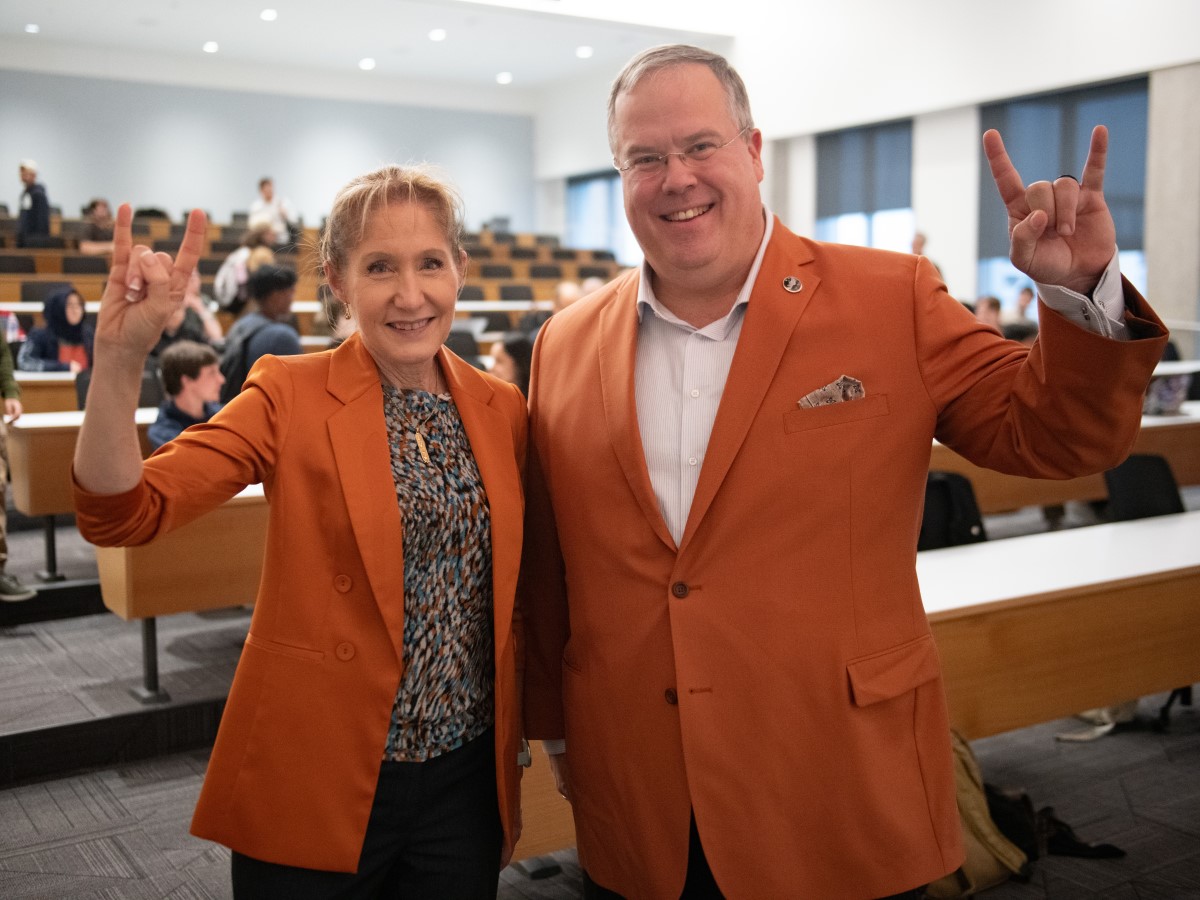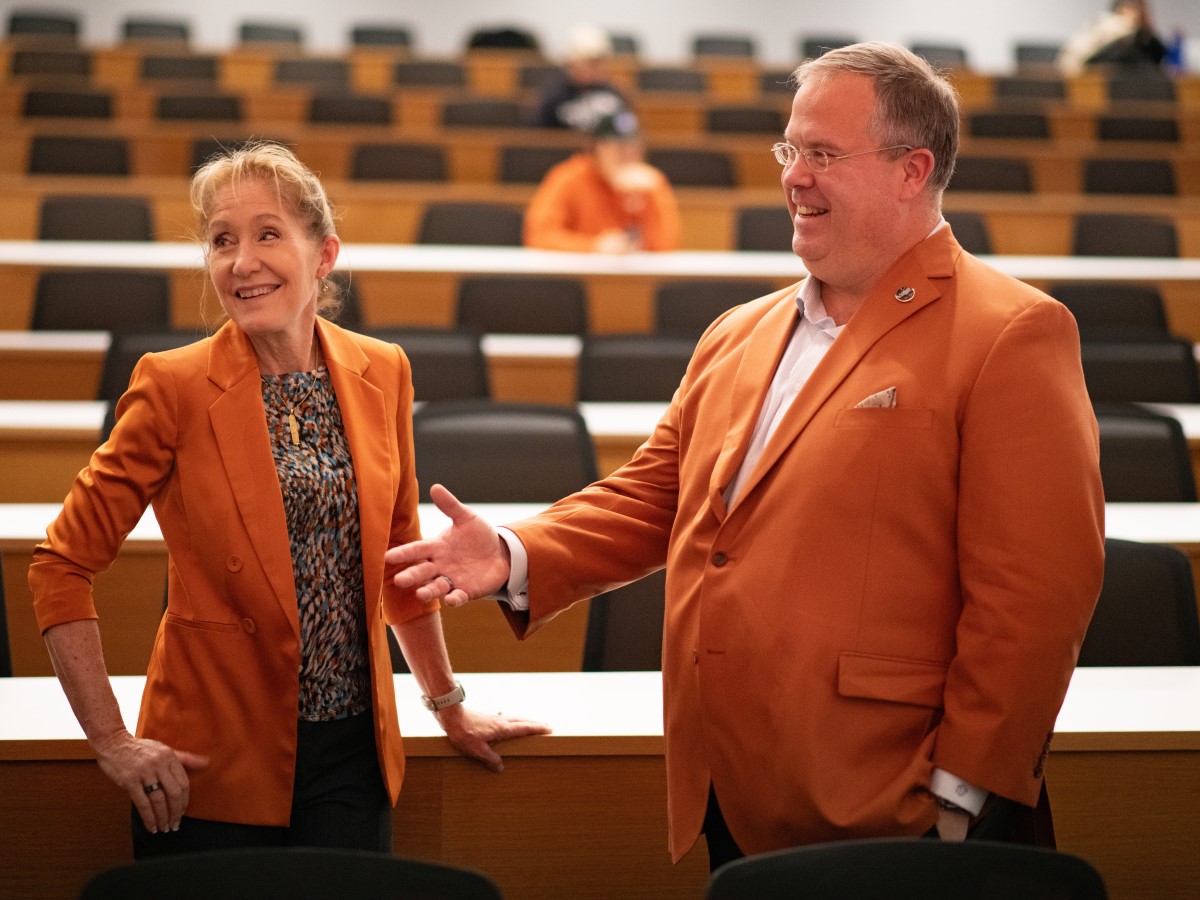‘It’s Not Win or Lose, it’s Win or Learn’: Bold Leaders Give Advice to the Next Generation

Texas Engineering alumni Tim Crain (right) and Jeannie Leavitt (left) at the Bold Leadership Download event
Successful leaders are ones who learn from their failures — and create a culture where all ideas are welcome to the table.
This was the advice given to students by the panelists at the Cockrell School of Engineering’s second Bold Leadership Download on December 3, 2024. This panel, moderated by students from the Texas Rocket Engineering Lab, featured alumni Jeannie Leavitt (B.S. aerospace engineering 1990) and Tim Crain (B.S. aerospace engineering 1995, M.S. 1999, Ph.D. 2000).
The conversation spanned topics of career success, fostering innovation through collaboration, and why failure is essential for creating meaningful change.
Major General Jeannie M. Leavitt (ret.) served as the U.S. Air Force and Space Force chief of safety. She is a graduate and former instructor of the U.S. Air Force Weapons School and is a command pilot with more than 3,000 hours, including more than 300 hours in combat.
Crain co-founded Intuitive Machines in 2013 as a think tank to apply NASA engineering approaches to intractable problems across aerospace, energy and medicine. In 2024, Intuitive Machines successfully landed the first American lunar lander on the moon since 1972. It has two more launches planned for 2025.
Read on for highlights from the panelists.

On Leadership: “In weapons school, there were three characteristics that you would not graduate without having: humility, approachability, and credibility. You needed to know your weapon system, integration and warfighting inside and out. You had to be an absolute expert. You were the instructor’s instructor when you went back to your squad. So, you had to be credible, but you also have to be humble and approachable in order to pass on that knowledge. Those were the three traits we ensured that ever weapons instructor had before they graduated from the program. I’ve found they apply to leaders in any role, at any level.” — Jeannie Leavitt
On Failure: “I heard a phrase a while back that said, ‘It’s not a win or lose. It’s win or learn.’ So when you fail, be honest in your evaluation process and about why you failed. Own up to what led you down the path to the wrong decision, based on the information you have now. That can be tough sometimes, but that’s the reality of engineering. It’s definitely the reality of engineering on the edge. But I would say for this current cohort of engineers and scientists, you’ve really got a great environment to learn power of failure. If you only do the things that you know are going to succeed, you’re never change things, or make a difference.” — Tim Crain
On Empowerment: “When you’re leading a team, you need to tell them what the strategic mission and vision are in order to guide and focus where the team is going. But you also need enable your team to speak up, give them the training and resources they need to succeed. One of the things that I found most effective and rewarding in leadership is to empower your people. When everyone feels like they have a voice, your team is better for it. Because you don’t know where the next great idea is coming from and when everyone feels that they can bring those ideas forward, you get incredibly powerful and effective teams.” — Jeannie Leavitt
On Innovation: “Innovation is a word that’s thrown around a lot. I’m a big believer of innovation through collaboration. The more ideas you have from different people, the better. In an environment where your colleagues are approachable and supportive, people are going to feel comfortable being vulnerable and putting an idea out there with the team. It might not be a good idea, but in an atmosphere of approachability and honest trust, even if someone puts out an idea that doesn’t work, they’ll think, ‘Okay, I’m glad I put it out. A no is not an attack on me, it was an assessment of the idea.’ And when you can foster a froth of ideas from different people, that’s where you really get an explosion of innovation. Because somebody’s going to hit on that one genius idea that’s needed for success.” — Tim Crain
